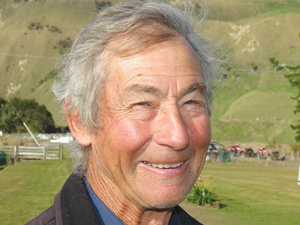Storm-damaged trees still causing havoc in Southland
Southland farmers are being urged to put safety first, following a spike in tip offs about risky handling of wind-damaged trees
The ban on passengers on quads is inhibiting farmers getting good professional advice, says a Gisborne farmer, Mark Gemmell.
Rural News has been inundated with calls and letters from farmers concerned about WorkSafe New Zealand’s ban on carrying passengers on quads. They complain chiefly that the new rules are impractical, made by bureaucrats who don’t understand what life is like onfarm and that the rules will harm farm businesses.
Mark Gemmell, who runs a 720ha sheep and beef farm 50km from Gisborne, told Rural News the issue of pillion passengers on quads has got “completely out of hand”. The people making the rules fail to recognise the absurdity of some of them, he says.
“I have a couple of big Labrador dogs that weigh 40kg each and an old huntaway bitch that’s about 30kg. I willingly cart them around on my quad and I have never tipped it over.”
Gemmell, who works off farm for Ballance Agri-Nutrients, believes the best way of developing relationships with farmer clients is by sitting on the back of a bike – looking at the stock, sticking to the tracks, being sensible, doing soil testing and giving advice on their stock policy.
 And another Gisborne farmer, James Brownlie, applauds WorkSafe’s attempts and encouragement of the culture and safety – because “it’s well needed and there has to be some change of attitudes”. But, he says, unfortunately he cannot support the stance WorkSafe has taken on passengers on quads.
And another Gisborne farmer, James Brownlie, applauds WorkSafe’s attempts and encouragement of the culture and safety – because “it’s well needed and there has to be some change of attitudes”. But, he says, unfortunately he cannot support the stance WorkSafe has taken on passengers on quads.
“Passengers on quads are an integral part of normal, everyday farm life and we can’t do without it,” Brownlie told Rural News. “It’s not at all dangerous, but is perceived as being dangerous because of the raising of the centre of gravity on a quad, based on static loads.
“But the human load can get off quickly when there is a problem, whereas it’s impossible to jettison a bag of fertiliser or anything else which might be on the back. I often have up to six dogs on the back of my quad and they are all trained so that in any tricky situation they jump off when they are told to.”
Brownlie is bothered that WorkSafe has been unable to provide any evidence that more than one person on a quad has a causative effect in an accident. He travels about 1000 hours a year on his quad and his staff do even more. He says given the kilometres these vehicles are driven, the accident rate is extremely low.
Brownlie believes the reaction of large farming enterprises, such as Landcorp, in banning passengers is a ‘knee-jerk’. He claims WorkSafe has taken on the corporate farms and the boards of these organisations are not prepared to stand up to the government safety body for fear of prosecution.
“I can see where the boards are coming from because they have had the gun pointed at them,” he says. “But I think they have got it wrong on this particular one.
“Farmers know their quads better than bureaucrats in Wellington. A farm consultant told me there is nothing safer than a farmer on his own tracks on his own quad. That consultant says he’d rather ride with that farmer than on his own quad. The safest thing is to be a passenger with an experienced person.”
Legal controls on the movement of fruits and vegetables are now in place in Auckland’s Mt Roskill suburb, says Biosecurity New Zealand Commissioner North Mike Inglis.
Arable growers worried that some weeds in their crops may have developed herbicide resistance can now get the suspected plants tested for free.
Fruit growers and exporters are worried following the discovery of a male Queensland fruit fly in Auckland this week.
Dairy prices have jumped in the overnight Global Dairy Trade (GDT) auction, breaking a five-month negative streak.
Alliance Group chief executive Willie Wiese is leaving the company after three years in the role.
A booklet produced in 2025 by the Rotoiti 15 trust, Department of Conservation and Scion – now part of the Bioeconomy Science Institute – aims to help people identify insect pests and diseases.